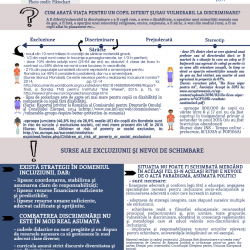În Romania, the women gained civil rights in 1923, according to the Constitution at that time, as per the principle of gender equality and the right to vote in 1938. Have you learned about that in school?
In 2015, the women are still subject to discrimination in Romania. Although a signatory part of numerous international treaties and conventions that enforce gender equality, Romania is last among the European Union countries in this sector. Thus, at all 6 indicators in the main areas – labour, money, knowledge, time, power, health – Romania is situated below the average of the European Union; while for other 2 indicators, intersectional inequalities and violence, data is not available. The international bodies place a strong focus on elimination of gender stereotypes, as one of the main causes that obstruct achievement of gender equality. One of these refer to the gender traditional roles, whose rigidity, says the European Commission, may limit “individual freedoms and may restrict both women’s and men’s potential. The promotion of non-discriminatory redefinition of the roles in all fields of life, such as education, carrier, labour market and sport thus constitutes an essential contribution towards gender equality.”
(Sourse Centrul Infodocumentar și de Dialog Pentru Femei: CIDD-FEM, Asociatia SPICC, ARAS si CRJ)









